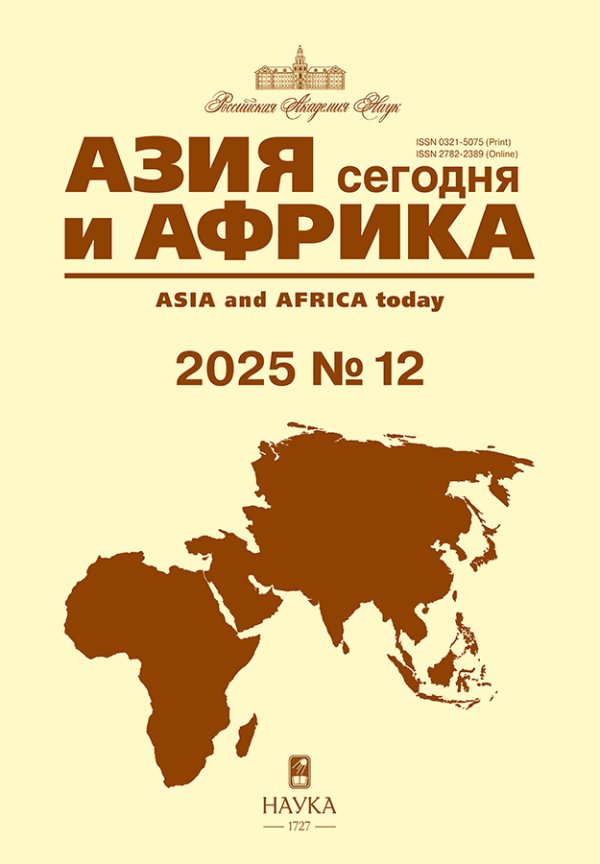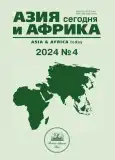Bangladesh’s Hedging Foreign Relations: The Dilemmas of a Weak State
- Авторы: Хасан А.1
-
Учреждения:
- НИУ ВШЭ
- Выпуск: № 4 (2024)
- Страницы: 39-46
- Раздел: Политика, экономика
- URL: https://journal-vniispk.ru/0321-5075/article/view/257190
- DOI: https://doi.org/10.31857/S032150750030606-8
- ID: 257190
Цитировать
Полный текст
Аннотация
The principle of non-alignment has been a cornerstone of Bangladesh’s foreign policy since its inception, holding significant relevance within both regional and global political contexts. But over time, local and external factors have caused the nation to stray from its founding ideals. The author attempts to explore Bangladesh’s foreign relations choices, examining its historical context and response to major power dynamics in the region. The paper seeks to unravel how Bangladesh has been a mecca of hegemonic power. By reviewing literature on geopolitics, Bangladesh’s foreign relations, and hegemonic powers, as well as in-depth expert interviews and scrutiny of media reports, articles, and dialogue, this study delves into the key powers’ dilemmas towards Bangladesh amidst its domestic upheaval. Three key explanatory variables emerge: first, its strategic geographic location and geopolitical significance – the interests of major powers; second, its economic potential and security dynamics; and finally, its domestic “winners take all” politics and the involvement of external powers. This study emphasizes that Bangladesh’s autonomy is fundamentally dependent on the goodwill of its political elites and highlights that failures in managing hedging relationships with each dominant power could lead to falling into the trap of geopolitics – financial crises and security risks.
Ключевые слова
Об авторах
А. Хасан
НИУ ВШЭ
Email: ahasan91hse.ru@gmail.com
ORCID iD: 0000-0001-7008-4228
аспирант Москва, Россия
Список литературы
- Abedin M.J. 2020. Foreign interference in Bangladesh: A case study of military-backed caretaker government in 2007-2008. European Journal of Social Science Studies. Vol. 4, № 6, pp. 34–54.
- Adluri Subramanyam Raju & R. Srinivasan. 2024. The Routledge Handbook of South Asia: Region, Security and Connectivity. London: Routledge.
- Ahmed I. 2011. Bangladesh Foreign Policy: Constraints, Compulsions and Choices. BIISS Journal. Vol. 32, № 3. Pp. 207–218.
- Riaz A. 2022. Bangladesh’s International Relations with South Asia and Beyond. Routledge Handbook of the International Relations of South Asia. Ed. by Sumit Ganguly & Frank O’Donnell. London and New York: Routledge. Pp. 258–274.
- Riaz A. 2022. More than Meets the Eye: Essays on Bangladeshi Politics. Dhaka: The University Press Limited.
- Anu Anwar. 2020. South Asia and China’s Belt and Road Initiative: Security Implications and Ways Forward. Hindsight, Insight, and Foresight: Thinking About Security in the Indo-Pacific. Ed. by Vuving A.L. Honolulu: DKI AsiaPacific Center for Security Studies. Pp. 16–178.
- Bhuiyan A.S.A. The national elections, legitimacy, and geo-politics. Dhaka Tribune. January 17, 2024. https://www.dhakatribune.com/opinion/op-ed/336964/the-national-elections-legitimacy-and (accessed 29.01.2024)
- Chakma B. 2019. The BRI and Sino-Indian Geo-Economic Competition in Bangladesh: Coping Strategy of a Small State. Strategic Analysis. Vol. 43, № 3, pp. 227–239.
- Foyez A. Bangladesh blocks US-sanctioned Russian ship from docking. Benar News. December 29, 2022. https://benarnews.org/english/news/bengali/russian-ship-blocked-12292022163118.html (accessed 13.03.2024)
- Hasan M. How India, the US, and China Can Impact Bangladesh’s Impending Election. The Diplomat. June 28, 2023. https://thediplomat.com/2023/06/how-india-the-us-and-china-can-impact-bangladeshs-impending-election/ (accessed 16.01.2024)
- Hasan M. Bangladesh’s crumbling democracy no roadblock for superpowers. 360. January 04, 2024. https://360info.org/bangladeshs-crumbling-democracy-no-roadblock-for-superpowers/ (accessed 29.01.2024)
- Hasib N.I. Russia opens new skilled manpower market for Bangladesh. Dhaka Tribune. December 7, 2023. https://www.dhakatribune.com/bangladesh/foreign-affairs/333240/russia-opens-new-skilled-manpower-market-for (accessed 13.03.2024)
- Hossain D., Islam S.M. 2021. Understanding Bangladesh’s relations with India and China: dilemmas and responses. Journal of the Indian Ocean Region. Vol. 17, № 1, pp. 42–59.
- Houda M.N. 2020. Domestic Inputs in Bangladesh Foreign Policy: An Overview. Ideas International Journal of Literature Arts Science and Culture. Vol. 5, pp. 152–167.
- Hall Ian. 2022. Liberal Approaches to the International Relations of South Asia. Routledge Handbook of the International Relations of South Asia. Ed. by Sumit Ganguly & Frank O’Donnell. London and New York: Routledge. Pp. 20– 31.
- Kugelman M. The U.S. Ups the Ante in Bangladesh. FP. May 31, 2023. https://foreignpolicy.com/2023/05/31/usbangladesh-visa-policy-election-democracy-promotion/ (accessed 26.01.2024)
- Kugelman M. What Russian warships in Chattogram port tells us about great power competition in Bangladesh. The Daily Star. December 19, 2023. https://www.thedailystar.net/opinion/geopolitical-insights/news/what-russian-war-ships-chattogram-port-tells-us-about-great-power-competition-bangladesh-3497506 (accessed 13.03.2024)
- Molla M.AM. US, India, and the election in Bangladesh. The Daily Star. February 25, 2023. https://www.thedailystar.net/opinion/views/news/us-india-and-the-election-bangladesh-3256391 (accessed 16.01.2024)
- Muhammad A. Bangladesh’s election formality is over. What’s next? The Daily Star. January 08, 2024. https://www.thedailystar.net/opinion/views/news/bangladeshs-election-formality-over-whats-next-3513671 (accessed 13.01.2024)
- Mustafa K. A review of the 2024 electoral drama. The Daily Star. January 08, 2024. https://images.thedailystar.net/opinion/views/news/review-the-2024-electoral-drama-351435 (accessed 13.01.2024)
- Nuruzzaman M. 2023. Bangladesh and the Rohingya Crisis: The Need for a Long-Term Strategy. The Washington Quarterly. Vol. 46. № 3, pp. 65–79.
- Plagemann J. 2022. Small states and competing connectivity strategies: what explains Bangladesh’s success in relations with Asia’s major powers? The Pacific Review. Vol. 35, № 4, pp. 736–764.
- Riaz A. The Great Game will continue. The Daily Star. January 09, 2024. https://www.thedailystar.net/opinion/views/black-white-grey/news/the-great-game-will-continue-3515081 (accessed 25.01.2024)
- Sohini Nayak. 2024. A Sub-Regional Resuscitation in South Asia: Enlivening the BIMSTEC. The Routledge Handbook of South Asia: Region, Security and Connectivity. Ed. by Adluri Subramanyam Raju & R. Srinivasan. Abingdon and New York: Routledge. Pp. 311–325.
- Sumit Ganguly & Frank O’Donnell. 2022. Routledge Handbook of the International Relations of South Asia. London and New York: Routledge.
- Yasmin L. 2022. Foreign Policy of Bangladesh: From Chrysalis of a State to an Emerging Middle Power. Journal of International Relations. Vol. 15. № 1–2, pp. 23–53.
- Cимония А.A. «Плавучий остров» – новый дом для рохинджа? Азия и Африка сегодня. 2019. № 9. DOI: 10. 31857/S032150750006271-0 Simoniya A.A. 2019. “Floating island” – a new home for Rohingya? Asia and Africa today. № 9. (In Russ.). DOI: 10. 31857/S032150750006271-0
Дополнительные файлы











